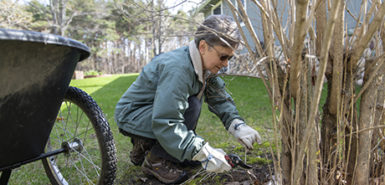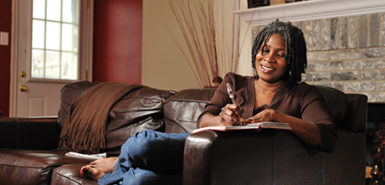When Newaygo, Michigan, resident Berdeana Matthews first realized her uterus had prolapsed, she wasn’t ready to take action. But as time passed, the pelvic bulging became more uncomfortable and difficult to ignore.
“I went through almost a whole year before it got really bad, where I couldn’t handle it any more because it was falling so much,” Matthews, 52, said. “It got so bad it was really uncomfortable to walk.”
That made it challenging in her job as a bartender, a thrice-weekly gig she has always enjoyed.
Her doctor in Lakeview, Michigan, suggested a pessary—a device inserted into the vagina to hold her pelvic organs in place, but she found it uncomfortable.
In the meantime, life became less enjoyable.
The former wedding DJ danced only a few steps at the wedding of a friend’s daughter. She put a hold on intimacy with her husband, Kevin. She couldn’t lift her grandchildren.
She also struggled with embarrassment.
“It put a damper on things and, mentally, it grabbed hold of me,” Matthews said. “I tried to stay focused on the positive and not go into a deep depression.”
Back to normal
After a year of discomfort, Matthews grew desperate.
That’s when she received a referral to see Nima Shah, MD, a Spectrum Health urogynecologist specializing in female pelvic medicine and reconstructive surgery.
“Dr. Shah was so comforting and easy to talk with,” Matthews said. “She gave my husband more of a sense of what was going through my head. She was so amazing.”
Dr. Shah recommended pelvic floor reconstructive surgery, which included performing a hysterectomy and supporting the top of the vagina with sutures. A mesh sling also would help prevent urinary leakage.
“She really felt it was impacting her entire life and she didn’t feel like a woman,” Dr. Shah said. “She was so embarrassed and uncomfortable.”
A year later, she experienced a little urine leakage, and underwent physical therapy to learn exercises to strengthen her pelvic floor.
For the most part, Matthews’ life is back to normal.
The doting grandmother is lifting her grandchildren when she babysits two days a week. She’s tending bar and enjoying the customers, who she says are like a “huge family.”
And she and her husband are intimate again.
Although Matthews felt quite young for a complete uterine prolapse, age isn’t the only factor that can cause the problem, according to Dr. Shah. Prolapses can also be triggered by vaginal births, changes with menopause, genetics, or even by lifting heavy objects.
“I want people to know that this isn’t something you have to live with,” Dr. Shah said. “There is so much we can offer to help improve the quality of life.
“Women deserve the best care possible.”




 /a>
/a>
 /a>
/a>
 /a>
/a>